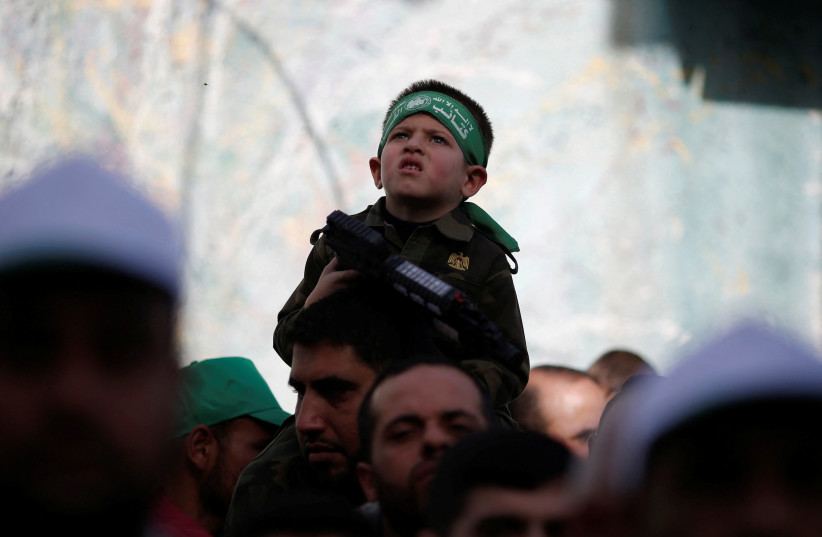A 59% plurality of Israelis believe that Israel did not win the war with Hamas in Gaza this past May, a recent INSS survey and report found.
Paradoxically, the same general public also viewed the war as justified, though there were disputes about which reasons for war could be defined as worthwhile.
The impetus for the study was the ongoing discourse since the 2006 Second Lebanon War about how the public perceives victory in military conflicts when neither side achieves an unconditional surrender from the other.
Breaking down the 59%, 44% answered that neither side won, and 15% percent answered that both sides lost.
Only 32% thought that Israel won.
The study, authored by senior research fellow at INSS and Tel Aviv University lecturer Zipi Israeli and INSS media relations associate Ruth Pines, pointed out that the public had similar feelings about the Second Lebanon War and the 2014 Gaza War, both during the conflicts and in hindsight.

According to INSS, “The issue of the perception of victory in retrospect is important, as what remains in the public consciousness regarding the previous campaign can affect cognition vis-à-vis the next campaign.”
Curiously, despite a general sense of disappointment at the results of the military conflicts, 80% of the full Israeli population and 90% of Israeli Jews thought of the May Gaza War as justified.
In the eyes of Israelis, “military victory is seen in terms of ‘relative quiet.’” And additional but much less important priorities include how many casualties there are on the Israeli side (civilians/soldiers).
“This contrasts with the perception in the media and among the leadership in Israel regarding the price that Israelis are willing to pay in casualties,” said the report.
“A high number of casualties and damage on the other side, and international media and public opinion support for Israel, are seen by the public as marginal.”
In addition, “Control of enemy territory is a factor at the bottom of the public’s priorities, and this helps illustrate how much this factor belongs to outmoded discourse.”
In other words, Israelis are willing to tolerate high casualties on either side, global condemnation and no real territorial achievements as long as the operation achieves calm.
Israelis have also lowered the bar for what constitutes calm, with the public viewing “another military campaign is only a matter of time; it is not a question of ‘if,’ but ‘when’ it will break out.”
Another INSS report analyzed the second conference on the Establishment of a Middle East Zone Free of Nuclear Weapons and Other Weapons of Mass Destruction held at the UN on November 29-December 3, 2021.
Unlike some other conferences, this UN conference was not abused as a platform for an offensive against Israel, beyond calling for it to join the Nuclear Non-Proliferation Treaty (NPT), and it endorsed the principle of consensus.
“It is doubtful whether a decision on the establishment of the conference as a permanent mechanism until the drafting of a treaty will change Israel’s opposition in principle to the guidelines of the discussion,” the report posited.
However, INSS fellow and former senior Foreign Ministry official Shimon Stein recommended that Israel “consult with the US administration ahead of the upcoming NPT Review Conference scheduled for January 2022, with the goal of reaching a coordinated position, and present an initiative to establish a framework for a comprehensive discussion on regional security issues.”
Noting that Israel is not a member of the review conference mechanism, Stein asked whether it would send an observer, as it has done in the past.
He also advocated Jerusalem calling “for the establishment of a framework to discuss the issue of regional security, which must be inclusive in terms of the participating countries and comprehensive as far as the issues to be deliberated.”
Stein thought the normalization trend might help Israel for the first time to adopt a common position in this context.
Still, he recognized that Israel’s position was likely somewhat out of step with the Biden administration, since Israel only had backing for trying to alter the focus of the conference under the Trump administration.
For example, one focus is to call on Israel to join the NPT even before issues with the Palestinians and Iranians are resolved, where the Jewish state objects to giving up elements of its deterrence until it feels more secure.
Yet another INSS report analyzed whether Israel’s push to employ Gazans in Israel is actually succeeding at deterring Hamas from further conflict.
According to the INSS, “In the past two years, Israel has unofficially renewed the employment of Gaza Strip residents in Israel, and the number of Gazans who received ‘merchant permits’ rose to 10,000 in October.”
Reviewing the history of employment of Gaza residents in Israel and the connection between this employment, unemployment in the Gaza Strip and support for Hamas, the report concluded, “The effect of employment of 10,000 Gazans in Israel on unemployment in the Gaza Strip is likely to be limited, due to the considerable size of the Palestinian local labor force.”
Rather, they speculate that Israel might need to allow a minimum of around 43,000 Gazans into the country out of a workforce of around 474,000 to make a significant dent in Palestinian unemployment.
They also noted that prior to the First Intifada there were 150,000 Gazans working in Israel, but questioned the viability of returning to either the 43,000 or 150,000 number in light of skills needed and security issues.
Moreover, authors Dr. Haggay Etkes, an INSS fellow and former Bank of Israel official, and Prof. Esteban Klor, an INSS fellow and professor at the Hebrew University of Jerusalem, said, “Its effect on support for Hamas is unclear.”
The authors said support for Hamas remained strong during the pandemic even as unemployment spiked, because Gazans relied on Hamas more for providing a basic framework for living.
